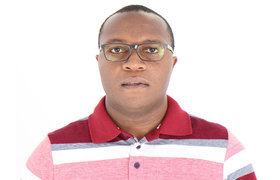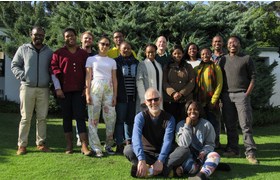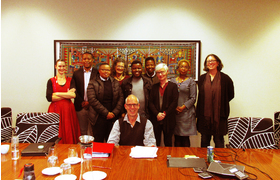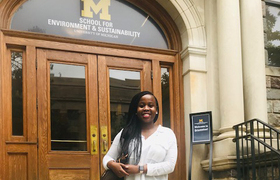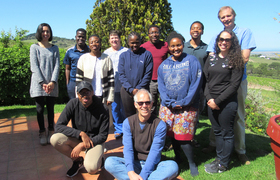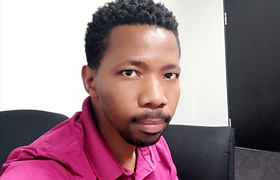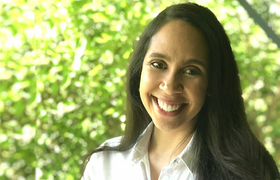Maxwell Tawanda Chirehwa: New nGAP associate
29 April 2020 | Story Maxwell Chirehwa. Photo Supplied. Read time 3 min.
Maxwell Chirehwa is a research officer in the Division of Clinical Pharmacology in the Department of Medicine at the University of Cape Town (UCT). He has been with the university since July 2013, first as a PhD student and then as a postdoctoral research fellow before his current appointment.
Chirehwa is originally from the small rural district of Nyanga in the eastern part of Zimbabwe. He stayed there for the better part of his life before starting his tertiary education. Growing up, he loved mathematics, but also had a soft spot for pharmacy, just because his uncle and aunt were pharmacists.
In 1996 he was selected as part of the first cohort of students to study computer science in the first year of high school. His love for mathematics faded, but six years later he found himself studying towards an honours degree in applied mathematics – not by choice, but because he had not attained enough entry points to study for a degree in computer science.
Chirehwa went on to complete a master’s degree in biostatistics with applications in public health at the University of Zimbabwe in 2008. His research focused on describing the relationship between socio-demographic characteristics and the rate of new sexual partner formation among adolescent girls in areas with a high risk of HIV infection.
After two years of conducting public health research, he was awarded the Vlaamse Interuniversitaire Raad – Universitaire Ontwikkelingssamenwerking scholarship to study towards a master’s degree in statistics, specialising in biostatistics at Hasselt University, Belgium. It was an honour for him to sit in classes taught by distinguished biostatistics professors. In the second year of his master’s degree (2012), he applied a newly developed statistical method to describe the spatial distribution of three fish species in the North Sea.
Research
Chirehwa’s research is in the field of pharmacometrics, which uses mathematical and statistical models to describe the time course of drug concentrations in the body and to explore relationships between these concentrations and drug effects (both beneficial and harmful). The focus of his research is on antituberculosis drugs. Pharmacometrics is a very scarce skill globally.
He also engages in the co-supervision of PhD students, maintenance of pharmacometric modelling software on UCT’s high-performance computing environment and assisting clinical researchers with statistical aspects of their research.
Five years ago, together with colleagues at Stellenbosch University, he developed and implemented a curriculum for a master’s degree in biostatistics. Recently, he has been participating in an initiative to build pharmacometric modelling capabilities in Africa. His motivation derives from the analysis of complex data to draw clear and simple conclusions to improve treatment outcomes.
“Maxwell is an incredible asset to our research group. His pharmacometric and statistical skills are both crucial for the clinical drug studies that we do. He has made important contributions to optimising doses of drugs used to treat tuberculosis,” said Gary Maartens, head of the Division of Clinical Pharmacology.
Chirehwa has already attended nGAP meetings and contributed his experience of UCT and his medical expertise in terms of making sense of COVID-19.
“I hope to learn from other associates and contribute significantly to the success of the prestigious nGAP programme.”
 This work is licensed under a Creative Commons Attribution-NoDerivatives 4.0 International License.
This work is licensed under a Creative Commons Attribution-NoDerivatives 4.0 International License.
Please view the republishing articles page for more information.
New Generation of Academics Programme (nGAP)
UCT has responded energetically to the New Generation of Academics Programme (nGAP), an opportunity provided by the Department of Higher Education (DHET) to build a new generation of black South African academics. The DHET’s 2015 vision document, “Staffing South Africa’s Universities Framework: A comprehensive, transformative approach to developing future generations of academics and building staff capacity”, proposes a suite of initiatives to address the challenge, with nGAP being the major instrument to increase the numbers of black South African academics.
The programme “involves the recruitment of highly capable scholars as new academics, against carefully designed and balanced equity considerations and in light of the disciplinary areas of greatest need”. The nGAP scholars are appointed into permanent positions where from the outset their conditions are customised to ensure their successful induction into the ranks of established academics.
The DHET provides funding over a six-year period to support the appointment of an nGAP lecturer, and their time is protected to provide the best possible opportunity for the completion of a doctorate degree in the shortest possible time. Once the degree is completed, the nGAP lecturer’s teaching commitments are steadily increased until they shoulder a full teaching load.
Since the first advertisement for nGAP posts in 2015, UCT has been awarded 17 nGAP positions: 5 (Phase 1), 4 (Phase 2), 3 (Phase 3) and 5 (Phase 4). These are distributed across all faculties.
UCT’s nGAP scholars operate as a single cohort, managed and coordinated by Dr Robert Morrell. Lecturers meet for quarterly meetings, writing retreats and various capacity-building activities all designed to support the completion of postgraduate qualifications (particularly doctorates) and to develop records of achievement that will testify to their emergence as self-standing, excellent academics. Each lecturer is mentored by a senior scholar, who provides support and guidance on the challenges that routinely face academics.
The nGAP manager sets great store in building the cohesion of the cohort and encouraging the establishment of new UCT networks while producing a collaborative, mutually supportive and embracing work culture.
According to Dr Morrell, “This group of academics will lead UCT in 15 to 20 years’ time ... Their vision of excellence, of being African and South African, of serving a wider community and producing knowledge for the planet, the continent and the country, will power UCT in years to come.”
Newsletters
In the news

